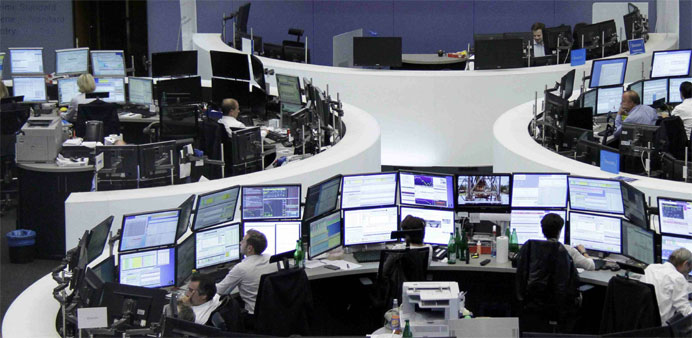AFP/ London
Global stock markets plunged and commodity prices hit new lows Monday extending a Chinese-led rout, fed by fears of a damaging slowdown in the world's second-largest economy.
Chinese stocks have tumbled since peaking in mid-June and authorities have launched broad interventions to try to restrain the drops, but Beijing's latest market intervention has failed to restore confidence.
Several European markets sank more than seven percent in afternoon trades, while US stocks tumbled at the open with the Dow dropping more than three percent.
China-linked shares again led the stocks sell-off, with Shanghai closing down 8.49 percent, the biggest daily loss since February 27, 2007.
"The fog of fear over the state of the Chinese economy is only thickening, and with little in the way of non-Chinese news to come this Monday, the markets are going to struggle to escape today without some fairly ugly scars," said Connor Campbell, a Spreadex financial analyst.
Falling oil prices also weighed on market sentiment as they slid below $40 a barrel for the first time since 2009, after weak Chinese manufacturing data deepened fears that the Asian giant is growing more slowly than thought.
Global equities have lost more than $5 trillion since China's shock currency devaluation on August 11.
At mid-afternoon, Frankfurt's blue-chip DAX 30 index was down 6.79 percent at 9,537.91 points, while the CAC 40 in Paris trading dropped 6.57 percent to 4,329.12 after earlier sinking more than eight percent.
London's benchmark FTSE 100 index of leading companies lost 5.02 percent to stand at 5,877.01 compared with Friday's close.
"Things are probably going to get worse before they get better," Nader Naeimi, head of dynamic asset allocation at AMP Capital Investors in Sydney, told Bloomberg News.
"You really need rate cuts and more policy easing in China. In the meantime, things can get worse."
About 15 minutes into trade on Wall Street, the Dow Jones Industrial Average lost 3.30 percent -- a more than 1,000 point drop from the opening level -- before recovering somewhat.
The broad-based S&P 500 sank 3.18 percent, while the tech-rich Nasdaq Composite Index fell 3.84 percent to 4,525.38.
- Unable to stimulate growth -
"We're following the situation in China very closely. However, the concrete fallout for the German economy is likely to be limited," a government spokesman for Europe's biggest economy told reporters in Berlin.
Other European markets that dropped more than five percent by mid-afternoon included Amsterdam, Brussels, Milan and Madrid. Oslo's commodities heavy index nosedived more than seven percent.
Crisis-hit Greece's main stock market plummeted more than 11 percent on Monday, succumbing to a Chinese-led sell-off and also domestic political uncertainty ahead of likely elections next month.
The euro meanwhile strengthened to $1.1599 from $1.1386 on Friday.
Russia's ruble also hit a new 2015 low and stocks sank, battered by falling oil prices and the impact of sanctions over Ukraine.
Data on Friday showing Chinese manufacturing activity slowed to a 77-month low had added to the gloom, signalling that even a campaign by Beijing with its vast arsenal of reserves has not been able to stimulate growth.
In other top Asian markets, Hong Kong's benchmark fell 5.17 percent, Tokyo 4.61 percent, and Sydney lost 4.09 percent.
More than 800 stocks listed in Shanghai fell by their maximum 10 percent daily limit, among them many of the brokerages that spurred a year-long rally that saw shares soar 150 percent before they collapsed in June.
Chinese authorities have since launched unprecedented measures to support stocks. On Sunday state media said the huge national pension fund would now be allowed to buy equities, in a fresh bid to prop up the market.
- 'Real disaster' -
The fund, which had some 3.5 trillion yuan ($550 billion) in net assets at the end of 2014, will be able to invest up to 30 percent of that in equities.
But local investors fear even Beijing's huge firepower will not be enough to stop the rout in Chinese shares, particularly after the benchmark Shanghai index fell through the key 3,500 point mark.
"This is a real disaster and it seems nothing can stop it," Chen Gang, Shanghai-based chief investment officer at Heqitongyi Asset Management Co, told Bloomberg News.
"If we don't cut holdings ourselves, the fund (managed by his firm) faces risk of forced closure. Many newly started private funds suffered that recently. I hope we can survive."
Oil prices also tumbled, accelerating losses after breaking below the $40 barrel for the first time in six years Friday on concerns about waning demand in China, the world's top energy importer.
Data showing the number of US drilling rigs rose last week, despite the slump in prices, added to concerns a global supply glut will last for years.
US benchmark West Texas Intermediate (WTI) for October delivery tumbled to $38.69, striking a level last seen in February 2009.
Brent North Sea crude for October dived in morning London deals to $43.28, last seen in mid-March of the same year.
Traders also dropped the dollar and moved into the yen -- a safe haven in times of turmoil and uncertainty -- while the currencies of Malaysia, Thailand and South Korea all hit new multi-year lows.
The greenback fell to 119.82 yen on Monday from 122.06 yen in New York Friday.

